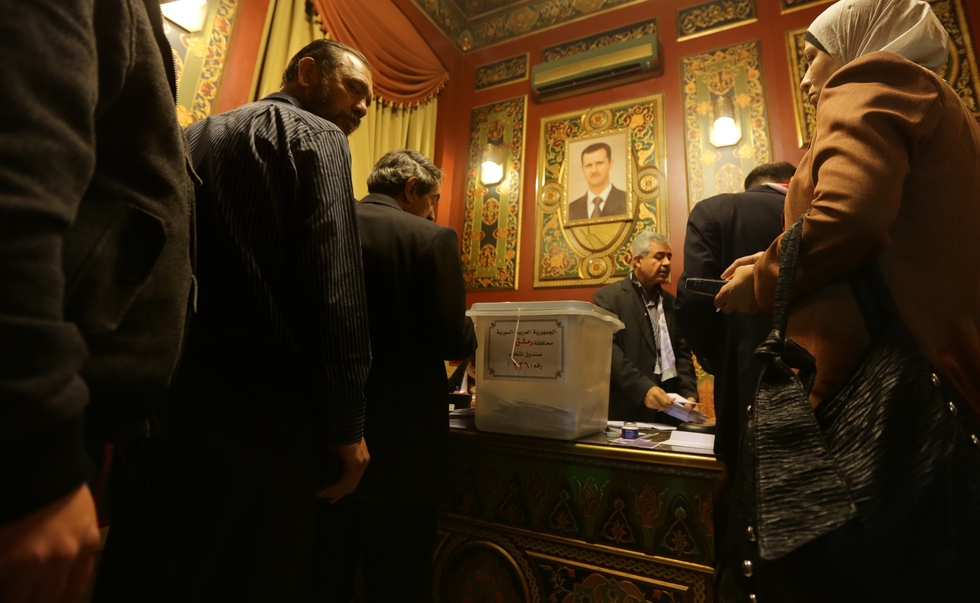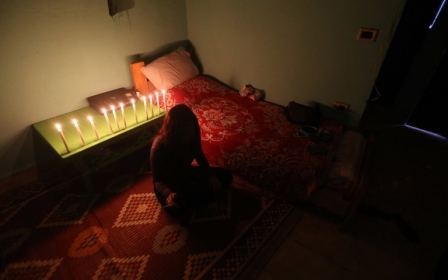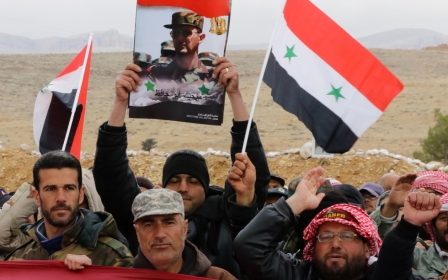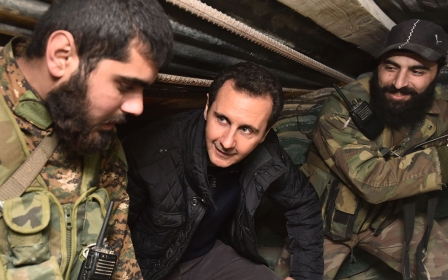A message to Assad from history: He who lives by the sword, dies by the sword

In Aeschylus's Agamemnon, the Greek tragedy of the Trojan wars, Clytemnestra says to Agamemnon, the brutal husband she kills: "By the sword you did your work, and by the sword you die.”
In Matthew, Jesus told one of his followers who had cut off a man’s ear: "Return your sword to its place, for all who will take up the sword, will die by the sword.”
The idea of karma or poetic justice for those who live by violence is a very old one. But more recent history suggests it also often comes to pass for political leaders in the modern era. We can think of a number of historical figures in recent times whose record of violence in life and in office reached its apotheosis in their own violent demise.
The most obvious are Hitler, Mussolini, Saddam Hussein and Muammar Gaddafi, to name just four. For a political leader to live by the sword, we should qualify this to say that the method by which they hold on to power is primarily one of violence, rather than say, political manoeuvring, electioneering or being born into the ruling clique. Such leaders typically seize power in a coup, hold on to it by the use to terror, and use war as their first choice of foreign policy.
Now there are many exceptions to this pattern, which begs the question of how far we can attempt to predict the fate of those rulers still living by this old adage.
We can think of Stalin, who came to power in a revolution and civil war, held on to it by employing hitherto unknown forms of terror against vast swathes of the population, yet died in his bed. How? By so ruthlessly destroying all potential rivals, that none remained to depose him, and by winning a world historic war against Nazi Germany that ensured the Soviet system's survival. In the same era, Francisco Franco, who overthrew Spain’s democratic republic and executed thousands of republicans, remained neutral during the Second World War, and was able to rule until his death in 1975.
Warmongers' comfortable retirement
The tyrants of imperial nations fare better, it seems, than those of small nations. Napoleon, who conquered Europe before defeat at Waterloo, ended up in exile. Germany’s Kaiser Willhelm retired comfortably to Holland. One can start a war, like George W Bush, then slink off the political stage into retirement. Bush did at least retire after eight ignominious years, which is a kind of get out clause for democratic warmongers (that’s you too Tony Blair).
Some of the sword wielders have survived by fleeing the stage. After his brutal reign, Uganda’s Idi Amin lived for years in retirement in Jeddah, while Ethiopia’s Haile Mariam, the bloody Derg leader who had to flee when his forces were defeated by rebel armies, was welcomed by Robert Mugabe in Zimbabwe, where he still resides, yet to be troubled by his conviction for genocide back home.
Which brings us to the war in Syria, where the president, who inherited the throne from his father, has certainly lived by the sword since 2011. Whatever degree of support for the regime remains in areas under its control, or rather fear of the alternative, it cannot take away from the terrible toll his ruthless war strategy has imposed on Syrians: half a million dead and half the population now refugees (4.6 million) or internally displaced (6.6 million).
How can any leader come back from such a catastrophe? Of course current geopolitics favours him, since the pro-Assad camp includes states with a strong will to impose their goals (Russia, Iran, Hezbollah) while the rebels’ friends (the US, Turkey, Saudi Arabia) are for various reasons - including fear of the Islamic State alternative - not prepared to do the same. (The fact some are touting al-Qaeda affiliate al-Nusra as a "moderate" alternative to IS in Syria smacks of desperation.)
21st century state slicing
This in theory brings us to a historical situation with limited parallels. In previous eras, regions and states were carved up by great powers, and their fate to some extent determined when power A agreed with power B to draw a line in the earth and call it peace. Post-WW2, for example, Poland and Hungary were stuck in the Soviet camp, despite historically having no desire to be there, while Greece, with a revolution inclined to align it with the Soviets, remained in the Western camp, and its leftists kept out of power for 70 years (the delayed victory was something of a let-down).
The post-war Middle East was divided up in the Cold War, with some turning to the Soviets as they broke free from European colonialism. Syria was in the Soviet camp, as for periods were Egypt, Yemen and Iraq.
History occasionally throws the cards into the air, and the pack is shuffled, dictators fall, and, more rarely, the grand lines drawn by great powers on the map are redrawn, as they were in 1989 after the fall of communism. But after Europe’s realignment post-1990, there have been no further major geopolitical upheavals. Instead states have been carved up. This first occurred in the Bosnian war, when Yugoslavia was dismembered into five states. We can also see this in Iraq, when a Sunni secular regime was first sanctioned then overthrown by the Americans and carved up between US-backed Kurds, Iran-backed Shias, and latterly Islamic State. It has also happened in Ukraine since 2014.
While in the 20th century great powers took advantage of upheavals like the collapse of empires to pull states into their orbit, in the 21st century, it appears that rather than redraw the map it is easier to create defacto statelets out of divided nation states.
Great power stalemate: Syria
In the Middle East two major factors have brought us to this: America’s retreat after a period of failed imperial muscle-flexing, and the absence of any Sunni power with sufficient legitimacy to rally forces. This leaves the field to Russia and Iran. While some sympathisers of the Syrian rebels implore their sponsors and allies to do more, they should recall that Iran can provide support and weapons without requiring the sign off from any powerful state. It is an independent power, which paid heavily for its independence, something Saudi Arabia has never done, and Turkey’s rulers may wish to do but, due to their bipolar relations with the West, cannot.
Which doesn’t answer the question of whether Assad, ultimately, must fall on his sword or someone else’s, given all the blood that has been spilt to defend his rule. Perhaps the answer is he will survive as long as his more powerful sponsors remain prepared to sacrifice more treasure and blood in his defence than their opponents are able or willing to invest and fight for his removal.
Could we have finally arrived at the point in history when neither the Greeks nor the Bible can tell us how the story ends? Perhaps Yugoslavia’s history can tell us how events may unfold, as they did in the time of Democrat frontrunner Hillary Clinton’s husband and then US president. Slobodan Milosevic, another nationalist demagogue, survived the first Balkan war for a few years, before the NATO Kosovo intervention saw his eventual demise.
It is too easy to paint the likes of Assad as victims of imperialist plots, when in fact they are cruel tormentors of their own people who have burnt down the house so that no one else can have it. Neither Assad nor any outside power - Saudi Arabia, US, Iran or Russia - should have a veto over ending Syria's nightmare.
Assad’s future does not look bright, even if geopolitics and the threat of extremism, which his policies helped create, currently favours him. As the Prophet Muhammad is quoted as saying in the Hadith: “Allah will not be merciful to those who are not merciful to others.”
- Joe Gill has lived and worked as a journalist in Oman, London, Venezuela and the US, for newspapers including Financial Times, Brand Republic, Morning Star and Caracas Daily Journal. His Masters was in Politics of the World Economy at the London School of Economics. @gill_joe
The views expressed in this article belong to the author and do not necessarily reflect the editorial policy of Middle East Eye.
Image: Syrians cast their votes for the parliamentary elections at a polling station in Damascus on April 13, 2016. The elections took place in government held areas but many opposition groups boycotted the polls. (AFP)
New MEE newsletter: Jerusalem Dispatch
Sign up to get the latest insights and analysis on Israel-Palestine, alongside Turkey Unpacked and other MEE newsletters
Middle East Eye delivers independent and unrivalled coverage and analysis of the Middle East, North Africa and beyond. To learn more about republishing this content and the associated fees, please fill out this form. More about MEE can be found here.





